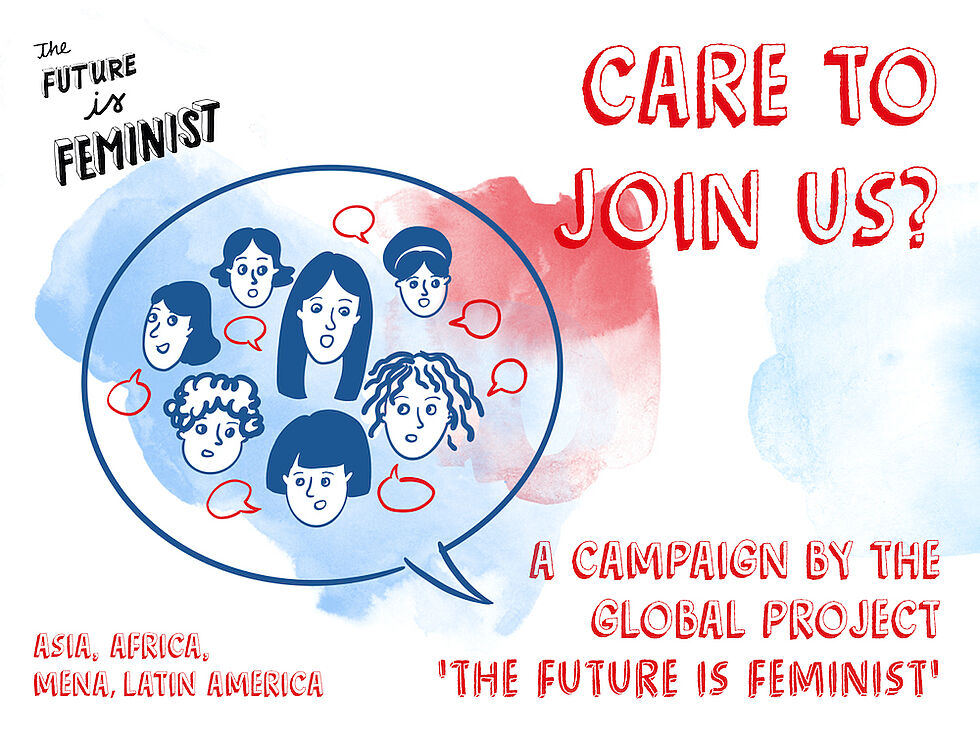Enhancing women’s future of work: Ideas from four corners of the world

The changes sweeping through the world of work could significantly boost women’s economic empowerment. But this will only happen if their rights are strengthened, especially for those women who are disadvantaged by geography, culture or educational status as well as by their gender. This challenge is the focus of the global FES project titled The Future is Feminist: Feminist Visions of the Future of Work. The project works with feminist networks worldwide to create a forum for exchanging ideas, experiences and political strategies.
One outcome of the project so far has been four expert reports on feminist visions and the future of work from Africa, the Middle East and North Africa, Asia, and Latin America and the Caribbean, respectively. The reports analyse the status quo in each region and formulate visions for a better future. The findings highlight how the challenges faced by women are in many ways specific to their respective region, class and location.
Nonetheless, the reports also found patterns in common across all communities: Women are over-represented in the informal and seasonal economy, which in turn exposes them to precarious, low-paying work with limited or no access to social protection services. Exclusion from the status and pay levels of formal employment also deprives those women of an opportunity to improve their standing within the household. Women across all four regions earn less than men, even when they are doing the same work. And many are exposed to gender-based discrimination and violence as well as sexual harassment, even in the formal sector.
Policies and societies are shaped by a narrow capitalist view of economic benefit
As well as facing unequal employment opportunities, women globally spend 2.5 times more hours per day on unpaid domestic labour than men. This can consist of care work, food processing or cleaning.
In the Middle East, 73 per cent of working-age women were reported to be outside of the paid labour force because of unpaid care responsibilities, compared with just 1 per cent of men. In Latin America, time-use surveys show that 77 per cent of unpaid work is undertaken by women. This work is essential for the functioning of society and has enormous economic value; but it is not recognized by the state nor reflected in policies that regulate work and social security.
This is because these policies – and our societies – are more influenced by a strictly capitalist definition of what is good for the economy. Anything outside quantifiable economic growth is considered unimportant. Women who spend their time on unpaid care work are consequently left without income or social security, even though their work underpins all human activities, including market-based ones. More women in paid work would benefit them as well as society. But the current degree of women’s participation in the workforce varies widely. For example, Latin America, with 50.2 per cent of women in the labour market, lies above the global average of 48.5 per cent, while the lowest participation of women in the labour market worldwide is in the region of the Middle East and North Africa.
Digital opportunities for the many not the few
Many feminists share common hopes and fears regarding the changes that digitalization may bring to the world of work. All four report authors agreed that digitalization can be considered neither an unqualified boon nor an unmitigated bane. Rather, its impact on women and their labour will vary according to other factors of inequality, namely global North versus South, urban versus rural, or rich versus poor.
Wealthy women in high-income countries are most likely to benefit from digitalization. They may have access to newly created jobs, or be relieved from some household chores. In contrast, poor women in developing countries are more likely to be left behind because they have no access to the sectors where digitalization creates new, high-skill jobs. Rather, they will be susceptible to its perils, as they often work in sectors such as service, manufacturing or production, where jobs will be displaced by automation. The four studies and other feminists in the project all call for the creation of digital justice and opportunities for the many not just the few.
Furthermore, women have less access to information technology than men, in particular in developing countries. This means that forthcoming digitalization in the world of work risks deepening gender inequalities unless it is accompanied by policies addressing this divide. Since digitalization is not separable from its social, political and economic context, discriminatory structures and underlying values have to be changed before women can benefit from it.
A specific example is the emerging platform economy. The promises of more flexibility and better family-work balance are counterbalanced by an increased risk of income insecurity, precarious employment and even threats to physical security. So, while the platform economy may have the potential to formalize informal work, without proper policy frameworks and legal-institutional checks to ensure appropriate working conditions and fair remuneration it may be simply a shift from one exploitative system to another.
Overall, women's participation in labour markets is becoming more complex amid technologization, digitalization and automation. Thus, members of project The Future is Feminist are developing a feminist framework and discourse centred on alternatives from a feminist perspective, based on the principles of social justice and ecological sustainability.
Ultimately, the notion of work needs to broadened and the relationship between paid and unpaid work redefined. Otherwise the changes in the world of work will worsen existing inequalities and contribute to the further degradation of women’s labour rather than harnessing their potential.
About the Author
Natalia Figge works at the Global Policy and Development department at FES and coordinates the work on gender justice. She is also the coordinator of “The Future is Feminist”, a global project of the FES, which works with feminists from Africa, Latin America, Asia, the Middle East and Europe to develop positive visions for a better future and analyses, in particular, the effects of digitalization and the future of work.
Laura Lepsy is a Master's student of international relations at Technische Universität Dresden. Currently she is interning with the FES Global Policy and Development department.







